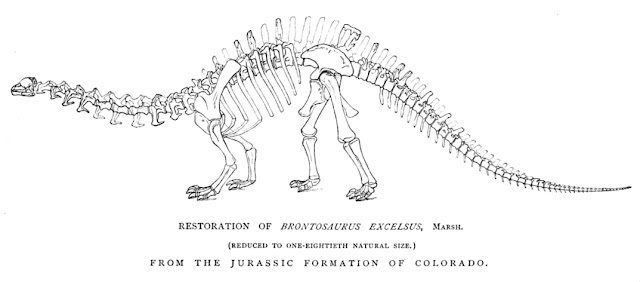One of the greatest problems with the past…
… is that the language they spoke then is different than what we speak (or write, or blog).
As a consequence, when you’re trying to search for historical content, you sometimes (often?) have to shift your language to accommodate the way authors in the past would have written.
For instance, when I was young, I grew up learning about a dinosaur called the brontosaurus. The way these things go, the name was more-or-less rescinded, and then brought back a few years later when a newer, finer distinction was made between the brontosaurus and the apatosaurus. If you’re curious, you can go read that article to hear the whole story about the name changes (and why they keep changing the name back and forth-it’s an interesting story).
 |
| The named, un-named, and restored (with a different skull) brontosaurus. |
But the reason I bring it up here is that terms can change significantly over time. I’ve written about this before (Search for terms from long ago), and we’re revisiting this idea with a couple of new Challenges. In the earlier post I gave a bunch of examples of terms that have shifted with time: Boers -> Afrikaners; insane -> mentally ill; outdoor relief -> public welfare; etc.
This terminological shift (a great phrase to use at your next party!) showed up a bit in my own research recently. Can you figure out how to answer these Challenges?
And, more generally, can you come up with a general way to help answer questions like this?
1. While reading about the US Civil War, I had read in one source that many of the soldiers died from some kind of disease that had extensive diarrhea. Yet, when I search in writings from that time, I find lots of diarrhea, but I seem to be missing many of the references. What other term(s) SHOULD I be using to search in archival accounts from that period for this disease?
2. These days, it’s popular to go to a spa that features natural hot springs, such as those at Wiesbaden (Germany) or Bath (UK). But if I’m searching for such a spa to visit in 1890’s America, what search terms should I use?
3. While reading about optics and the life of John Dollond (the inventor of the achromatic lens, for which you should be grateful), I learned that he died of a stroke. But I can’t find period accounts with that search term. What search term should I use instead to find an 18th century death by stroke?
This can be a little tricky… so when you give us your answer, be sure to tell us HOW you determined what the time-period appropriate term(s) should be! Did you just know off the top of your head, or what resources did you use to get this insider information?
Search on!




